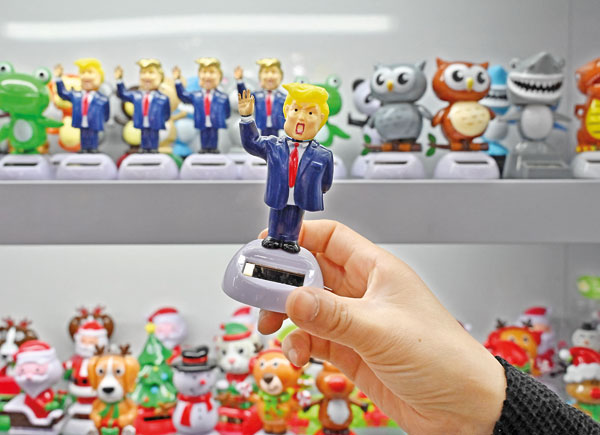Sunday Times 2
A trade war between world’s two biggest economies threatens to escalate
View(s):By Thalif Deen
UNITED NATIONS (IPS) – As the Trump administration’s hostility towards the United Nations keeps growing, a New York Times columnist last week proposed “something a little incendiary”.
Maybe Trump could follow up on his non-appointment of Elise Stefanik as US Ambassador to the United Nations—who was virulently anti-UN—by withdrawing the US from the UN entirely.
The UN’s 39-storey building, the Times columnist said, has “amazing views of the East River”—and would be a great condo conversion into a luxury apartment complex.
Is that a glimpse into a not-too-distant future?
Meanwhile, Trump’s staggering US tariffs worldwide have not only threatened the longstanding ground rules in world trade but also undermined the Geneva-based World Trade Organisation (WTO), described as the only global international organisation dealing with the rules of trade between nations.

As the trade war between the US and China escalate, a shop owner holds a made-in-china toy featuring US President Donald Trump in Yiwu, China’s eastern Zhejiang province on Thursday. AFP
At its heart are the WTO agreements, negotiated and signed by the bulk of the world’s trading nations and ratified in their parliaments. The goal is to ensure that trade flows as smoothly, predictably and freely as possible, according to the WTO.
In his unpredictable on-again, off-again decision-making, Trump backed down last week on most reciprocal tariffs for a period of 90 days, citing new talks with foreign nations, explaining his reversal. But China, he said, would not be included, and he raised tariffs on its exports to 125 percent.
Perhaps after 90 days, the tariffs will be at play once again, continuing to destabilise world trade and the global economy.
China has said it will impose reciprocal tariffs on all imports from the United States, escalating a trade war between the world’s two largest economies.
Mandeep S. Tiwana, Interim Co-Secretary-General of CIVICUS, a global alliance of civil society organisations (CSOs), told IPS: “We are witnessing a complete breakdown of the rules-based international order and entering a dangerous age of go-it-alone transactional diplomacy by rich and powerful states.”
This, he pointed out, “could lead to disastrous consequences for the world as we know it”.
Sadly, humanity has been here before in the period prior to the start of the First and Second World Wars in the twentieth century, which caused immeasurable death and destruction.
Autocratic and populist regimes are deliberately undermining international norms that seek to create peaceful, just, equal and sustainable societies.
Notably, civil society organising and citizen action offer the last line of defence against the relentless assault on cherished ideals enshrined in constitutional and international law,” said Tiwana.
Asked if the rash of tariffs would lead to a global economic recession, UN Secretary-General Antonio Guterres told reporters on April 8, “I’ve been clarifying my position about this issue time and time again. Trade wars are extremely negative. Nobody wins with a trade war. Everybody tends to lose.”
“And I’m particularly worried about the most vulnerable developing countries, in which the impact will be more devastating. I sincerely hope that we will have no recession, because a recession will have dramatic consequences, especially for the poorest people in the world,” he warned.
Dr Jim Jennings, president of Conscience International and executive director of US Academics for Peace, told IPS the widespread “Hands Off” protests in the US threaten to return the country to the decades of debate over tariffs that took place during the 19th century. The issue then, as now, was protectionism—believed to enrich the manufacturing class.
Whereas the Whigs (today’s Republicans) wanted high tariffs, he argued, the idea of free trade as a way to reach prosperity was the mantra of the Democrats, who favoured the working class.
President Lincoln favoured tariffs, but by 1860 admitted that arguing for a protective tariff was unwise for political reasons—few people at that time favoured it.
Most Americans had come to realise that high tariffs were protecting the moneyed class and simply raising taxes for everybody. Lincoln knew he was unlikely to be elected president if tariffs were the key to his campaign.
“While the idea of comparing our globalised economy to that of 1840-60 is problematic, with the world already teetering on the verge of WW III, a trade war is the last thing we need,” declared Dr Jennings.
Andreas Bummel, Executive Director, Democracy Without Borders, told IPS from the standpoint of democratic checks and balances, it is concerning that the US President apparently can unleash a trade war with most of the world’s countries while the US Congress simply looks on.
Meanwhile, President Trump, who withdrew the US from the UN Human Rights Council and the World Health Organisation (WHO), has threatened to pull out of UNESCO and the UN Relief and Works Agency (UNRWA) for Palestine Refugees in the Near East—and also to terminate US contracts with the World Food Programme (WFP) in Rome.
But according to an Associated Press (AP) report on April 9, the State Department has rolled back an undisclosed number of sweeping funding cuts to WFP’s emergency projects in 14 impoverished countries, saying it had terminated some of the contracts for life-saving aid “by mistake”.
“There were a few programmes that were cut in other countries that were not meant to be cut that have been rolled back and put into place,” State Department spokeswoman Tammy Bruce told reporters.
China has said it will retaliate by imposing reciprocal tariffs on all imports from the United States. “This practice of the US is not in line with international trade rules, undermines China’s legitimate rights and interests, and is a typical unilateral bullying practice,” China’s finance ministry said in a statement.
China has also filed a lawsuit with the World Trade Organisation, saying the US tariffs were “a typical unilateral bullying practice that endangers the stability of the global economic and trade order”.

